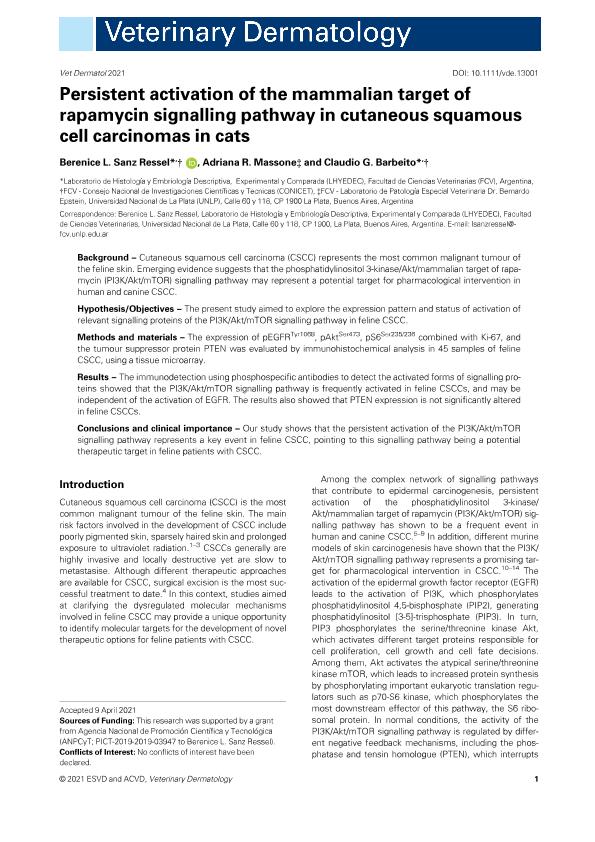Mostrar el registro sencillo del ítem
dc.contributor.author
Sanz Ressel, Berenice Liyare

dc.contributor.author
Massone, Adriana Raquel

dc.contributor.author
Barbeito, Claudio Gustavo

dc.date.available
2022-06-10T12:18:31Z
dc.date.issued
2021-07
dc.identifier.citation
Sanz Ressel, Berenice Liyare; Massone, Adriana Raquel; Barbeito, Claudio Gustavo; Persistent activation of the mammalian target of rapamycin signaling pathway in cutaneous squamous cell carcinomas in cats; Wiley Blackwell Publishing, Inc; Veterinary Dermatology; 32; 6; 7-2021; 1-8
dc.identifier.issn
0959-4493
dc.identifier.uri
http://hdl.handle.net/11336/159452
dc.description.abstract
Background: Cutaneous squamous cell carcinoma (CSCC) represents the most common malignant tumour of the feline skin. Emerging evidence suggests that the phosphatidylinositol 3-kinase/Akt/mammalian target of rapamycin (PI3K/Akt/mTOR) signalling pathway may represent a potential target for pharmacological intervention in human and canine CSCC. Hypothesis/Objectives: The present study aimed to explore the expression pattern and status of activation of relevant signalling proteins of the PI3K/Akt/mTOR signalling pathway in feline CSCC. Methods and materials: The expression of pEGFRTyr1068, pAktSer473, pS6Ser235/236 combined with Ki-67, and the tumour suppressor protein PTEN was evaluated by immunohistochemical analysis in 45 samples of feline CSCC, using a tissue microarray. Results: The immunodetection using phosphospecific antibodies to detect the activated forms of signalling proteins showed that the PI3K/Akt/mTOR signalling pathway is frequently activated in feline CSCCs, and may be independent of the activation of EGFR. The results also showed that PTEN expression is not significantly altered in feline CSCCs. Conclusions and clinical importance: Our study shows that the persistent activation of the PI3K/Akt/mTOR signalling pathway represents a key event in feline CSCC, pointing to this signalling pathway being a potential therapeutic target in feline patients with CSCC.
dc.format
application/pdf
dc.language.iso
eng
dc.publisher
Wiley Blackwell Publishing, Inc

dc.rights
info:eu-repo/semantics/openAccess
dc.rights.uri
https://creativecommons.org/licenses/by-nc-sa/2.5/ar/
dc.subject
CAT
dc.subject
CSCC
dc.subject
MOLECULAR TARGETS
dc.subject
MTOR
dc.subject
SIGNALING MOLECULES
dc.subject
SKIN
dc.subject.classification
Otras Ciencias Veterinarias

dc.subject.classification
Ciencias Veterinarias

dc.subject.classification
CIENCIAS AGRÍCOLAS

dc.title
Persistent activation of the mammalian target of rapamycin signaling pathway in cutaneous squamous cell carcinomas in cats
dc.type
info:eu-repo/semantics/article
dc.type
info:ar-repo/semantics/artículo
dc.type
info:eu-repo/semantics/publishedVersion
dc.date.updated
2022-04-26T20:24:30Z
dc.journal.volume
32
dc.journal.number
6
dc.journal.pagination
1-8
dc.journal.pais
Reino Unido

dc.journal.ciudad
Londres
dc.description.fil
Fil: Sanz Ressel, Berenice Liyare. Consejo Nacional de Investigaciones Científicas y Técnicas. Centro Científico Tecnológico Conicet - La Plata; Argentina
dc.description.fil
Fil: Massone, Adriana Raquel. Universidad Nacional de la Plata. Facultad de Ciencias Veterinarias. Departamento de Patología. Laboratorio de Patología Especial Veterinaria "Dr. Bernardo Epstein"; Argentina
dc.description.fil
Fil: Barbeito, Claudio Gustavo. Consejo Nacional de Investigaciones Científicas y Técnicas. Centro Científico Tecnológico Conicet - La Plata; Argentina
dc.journal.title
Veterinary Dermatology

dc.relation.alternativeid
info:eu-repo/semantics/altIdentifier/url/https://onlinelibrary.wiley.com/doi/10.1111/vde.13001
dc.relation.alternativeid
info:eu-repo/semantics/altIdentifier/doi/http://dx.doi.org/10.1111/vde.13001
Archivos asociados
